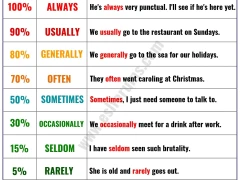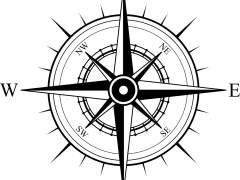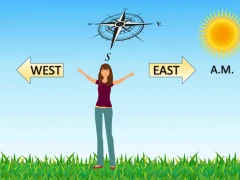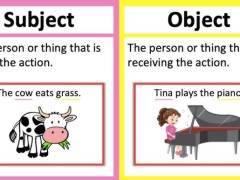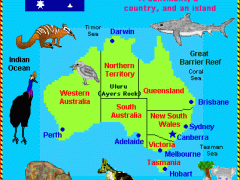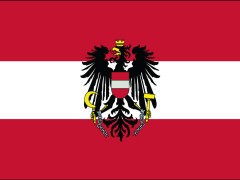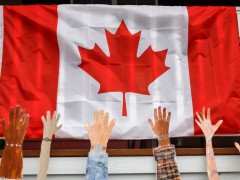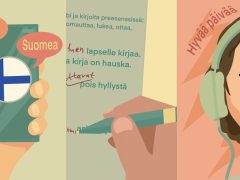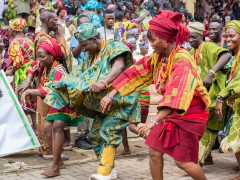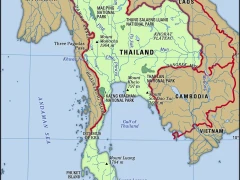mild [maild] adj. 温和的,温暖的
【反】wild 野性的
【搭】go wild 发狂 run wild 撒野
* * *
A: If you prefer something milder, there is rice wine.
B: What's that? I haven't heard of that before.
A:如果您愿意喝淡一点儿的酒,我们有米酒。
B:那是什么?我之前从来没听说过。
* * *
always [ˈɔːlweiz] adv. 总是
【扩】frequently 经常
【反】seldom 很少 hardly 几乎不
* * *
A: I heard that restaurant was always filled.
B: I'd better reserve in advance.
A:我听说那家饭店总是客满。
B:我最好提前预订。
* * *
north [nɔːθ] n. 北方
* * *
A: Which way is the wind now?
B: It's the north wind. Take care. Don't fall down the hatch.
A:现在是什么风向?
B:是北风。小心点儿,不要跌下舱口去。
* * *
east [iːst] n. 东方
wet [wet] adj. 潮湿的
west [west] n. 西方
【派】western 西方的
【搭】in the west of 在……的西部
* * *
A: Is it away from the city?
B: No, it's just half an hour's drive west from London.
A:离城里远吗?
B:不远,从伦敦往西半小时左右的车程。
* * *
south [sauθ] n. 南方
season [ˈsiːzən] n. 季节
【派】seasoning 调味品 seasonal 季节性的
【搭】the rainy season 雨季 the harvest season 收获的季节
* * *
A: Which season do you like best?
B: I like autumn best, because it's time for harvest.
A:你最喜欢哪个季节?
B:我最喜欢秋季,因为那是收获的时节。
* * *
best [best] adv. 最
【反】worst 最差的
【搭】try one's best 尽某人的最大努力
best man 男傧相
* * *
A: I'm looking forward to the Spring Festival. It's the best time of the year.
B: Is Spring Festival the most important festival in your country?
A:我正期待着春节的到来,那是一年中最好的时光。
B:春节是你们国家最重要的节日吗?
* * *
night [nait] n. 夜晚
【派】nightclub 夜店 nightlife 夜生活 nightfall 黄昏 midnight 午夜
【扩】dusk 黄昏 evenfall 黄昏 sunset 傍晚
【搭】at night 晚上 night watch 值班
* * *
A: You look tired, Lily.
B: Yes, I didn't go to bed until half past eleven last evening. I'll not watch TV at night any more.
A:莉莉,你看上去很疲惫啊。
B:是的,我昨天11点半才上床睡觉。以后夜里再也不看电视了!
* * *
rise [raiz] v. 升起
early [ˈəːli] adv. 早
set [set] v. (太阳)落下去
【派】setting 背景
【搭】set sail 启航 set sb. free 释放某人
* * *
A: The sun rises in the east and sets in the west.
B: Everybody knows it.
A:太阳从东方升起,从西方落下。
B:这每个人都知道。
* * *
late [leit] adv. 晚,迟
【派】lately 最近
【扩】sooner or later 迟早
【搭】late for school 迟到
* * *
A: I wish you do not be late for school any more.
B: Sorry, I'm sure it's the last time.
A:我希望你以后上学别再迟到了。
B:对不起,我肯定这是最后一次了。
* * *
interesting [ˈintristiŋ] adj. 有趣的,有意思的
【扩】interested 感兴趣的
* * *
A: What interesting places are there in this old city?
B: You can see them all on this list.
A:这座古城有什么好玩的地方吗?
B:你可以在这个单子上看到。
* * *
subject [ˈsʌbdʒikt] n. 话题
conversation [ˌkɔnvəˈseiʃən] n. 谈话
【派】conversational 健谈的
【扩】talk 谈话 dialogue 对话
【搭】have a conversation with 与……谈话
* * *
A: Sorry, I must end the conversation.
B: Do you want to leave now?
A:抱歉,我得结束这个谈话了。
B:你现在就要走?
Lesson 54 What nationality are they? 他们是哪国人?
Where do they come from? 他们来自哪个国家?
| Australia n. 澳大利亚 | Finland n. 芬兰 | Turkey n. 土耳其 |
| Australian n. 澳大利亚人 | Finnish n. 芬兰人 | Turkish n. 土耳其人 |
| Austria n. 奥地利 | India n. 印度 | Korea n. 韩国 |
| Austrian n. 奥地利人 | Indian n. 印度人 | Polish n. 波兰人 |
| Canada n. 加拿大 | Japan n. 日本 | Poland n. 波兰 |
| Canadian n. 加拿大人 | Nigeria n. 尼日利亚 | Thai n. 泰国人 |
| China n. 中国 | Nigerian n. 尼日利亚人 | Thailand n. 泰国 |
adjective [原级]伤病)不严重的,轻微的;(感觉或表情)不强烈的,微弱的;(惩罚或批评)不严厉的;轻的,不过度的;(味道)清淡的,不刺激的;(药物、化妆品等)柔和的,无副作用的;(肥皂、洗涤液)温和的,不伤皮肤的;(天气)和煦的,温暖的;(人或其行为)和善的,随和的 - He's a mild, inoffensive man.
- It is mild in fall. 秋天天气很温和。
- mild food 清淡的食物
- spicy food 辛辣的食物
adverb [频率副词]总是,每次都是;一直,长久以来;永远;老是,一再;总还有(表示有另一种可能) - If something is always the case, was always the case, or will always be the case, it is, was, or will be the case all the time, continuously.
- She always arrives early for work. 她总是早到上班。
- He always makes me smile. 他总是让我微笑。
noun [专属名词]北,北方;北部(地区);北方发达国家(the North);(桥牌)北家(North) - The north of a place, country, or region is the part which is in the north.
adverb [地点副词]向北,朝北;大于 - Something that is north of a place is positioned to the north of it.
adjective [原级]北方的,朝北的;(风)北方吹来的 - A north wind is a wind that blows from the north. (
noun [具体名词]南,(罗盘的)南方;(某个地方、国家、区域的)南部;美国南部各州,英格兰南部(the South);(南半球的)发展中国家(the South);(桥牌)坐在南首位置的人(South) - The south of a place, country, or region is the part which is in the south.
adjective [原级]位于南方的,朝南的;(风)来自南方的;(用于国家、州或地区等的名称中)南部的,南部居民的 - The south edge, corner, or part of a place or country is the part which is toward the south.
adverb [地点副词]向南,朝南;去南方,在南方;低于(south of);<美,非正式>下滑,恶化 - Something that is south of a place is positioned to the south of it.
verb [vi. 不及物动词]向南方,朝南;(天体)穿过子午线 - "South" is used in the names of some countries, states, and regions in the south of a larger area.
noun [专属名词]东,东方(the east);(世界或某个国家、地区或城市的)东部;东方(指亚洲南部和东部,包括印度、中国和日本)(the East);(旧时)东欧共产主义国家(the East);(桥牌)坐在东首位置的人(East) - The east of a place, country, or region is the part which is in the east.
adjective [原级]近东的,面朝东的;(特定的地区、城市、国家或其居民)东部的;东风的;在教堂设有圣坛的一端的(实际上的东端) - East is used in the names of some countries, states, and regions in the east of a larger area.
adverb [地点副词]向东,在东方 - Something that is east of a place is positioned to the east of it.
noun [专属名词]西,西方;(某个国家、地区或地方的)西部;西方国家 (指美国、加拿大以及西欧、北欧和南欧诸国)(the West);(美国)西部(尤指密西西比河以西诸州)(the West, the west);<史>西方(国家)(与东欧前共产主义国家相对的欧洲和北美洲的非共产主义国家)(the West);(桥牌)坐在西首位置的人 - The west of a place, country, or region is the part of it which is in the west.
adjective [原级]西方的,向西的;(风)来自西方的;(用于国家、州和地区的名称中)西部的 - The west part of a place, country, or region is the part which is toward the west.
adverb [地点副词]向西方,朝西方;…以西 - If you go west, you travel toward the west.
adjective [原级]湿的,潮湿的;(天气)下雨的,多雨的;(油漆、墨水等)未干的;(婴幼儿或尿片)尿湿的;软弱的,优柔寡断的;<非正式>允许售酒的,不禁酒的;(尤指被右翼保守派认为)具有自由主义倾向的保守派的;(人) 嗜好酒的;用水(或其他液体)的;(鱼)新鲜的;(轮船)易(从船首或舷侧)进水的 - He toweled his wet hair.
noun [物质名词]雨,雨天(the wet);<英>保守党温和派成员;湿气,水分,液体;<英>软弱的人,窝囊废(含贬义);<英,非正式>酒;<美>反禁酒者 - They had come in from the cold and the wet.
verb [vt. 及物动词]把(某物)弄湿;(尤指婴儿或小孩子)把…尿湿;(倒入滚烫的开水)沏(茶);变湿 - A quarter of 4-year-olds frequently wet the bed. 4
noun [抽象名词]季节;(某种特殊气候的)季;(某种活动或事件发生的)时期;体育赛季;(水果、蔬菜等的)当令期,上市期;度假旺季,法定假期;(一年中时装、发型等的)流行期;(一系列新的电视剧、戏剧等的)播出期,上映期;发情期;(英国上流社会的)社交活动时节(the season);<古>适当的时机;<古>某时,一段时间 - Autumn is my favourite season.
verb [vi. 不及物动词]加调料,给…调味;给…增添趣味;使(木材)风干,晒干(木材);变干燥 - The menu varies with the season.
adjective [最高级]最好的,最出色的;最愉快的,最幸福的;最合适的,最恰当的 - Lighter shades suit you best.
adverb [程度副词]最,最高程度地;最出色地,最高标准地;最适合地,最恰当地 - He's the best man for the job.
noun [抽象名词]最好的事物(或人);(人或事物所能达到的)最高标准;最合乎要求的事物;(个人的)最高水平,最高纪录;最好的衣服,盛装;<美>(书信结尾的)良好祝愿 - He's the best man for the job.
verb [vt. 及物动词]打败,胜过 - Which one do you like best?
- This is the best movie I've ever seen. 这是我见过的最好的电影。
- He always does his best in his exams. 他在考试中总是尽力而为。
noun [专属名词]夜间,夜晚;晚上,傍晚;<文>黄昏;(特殊活动之)夜;黑夜,夜色;挫败时期 - The fighting began in the late afternoon and continued all night.
adjective [原级]夜晚的;夜晚使用的;夜间进行的;夜晚活动的 - It's eleven o'clock at night in Moscow.
interjection [请求]晚安(goodnight 的简称) - Dozens of doctors and nurses have been working day and night for weeks.
verb [vi. 不及物动词](数字、 数量、价值)增加,(质量)提高;升起,达到较高水平(或位置);(尤指从坐姿)起身,站起;取得成功,(权力或地位)升高,提高;(建筑物或自然景观)耸立,矗立;(建筑物)被建起 - Wilson's ice-cold eyes watched the smoke rise from his cigarette.
noun [抽象名词](数字、 数量或价值的)增加,(质量)改善;<英>(工资的)上涨,增加;(地位的)升高,(优势、重要性、受欢迎程度等的)增强; 上升,升起;斜坡,小山丘,高地;(楼梯的)级高,(拱的)矢高,(斜坡的)垂直高度;(声音或声调的)提高;源头,起源;(运动或活动的)兴起,高涨 - A rise in the amount of something is an increase in it.
verb [vi. 不及物动词]放,置;使开始;把故事情节安排在;设置;摆放餐具;镶嵌;安排;树立;布置;凝固;使现出坚定的表情;固定发型;把(断骨)复位;排版;为…谱曲;落(下);布置(戏剧、电影或电视节目的布景);(断骨)愈合 - I've collected the complete set.
noun [集合/集体]一组(类似的东西);一组(配套使用的东西);一伙(或一帮、一群)人;电视机;布景 ;舞台;(网球、排球比赛等的)盘;集;一组歌曲(或乐曲);(在某学科上能力相当的)一批学生 ;(尤指坚定的)姿势;头发的定型;凝固;兽穴;(供移植的)秧苗 - The team looks set for victory.
adjective [原级]位于(或处于)…的;安排好的;固定的;套(餐);有可能的;不自然的 - He set the fuse to three minutes.
adjective [原级]早期的,初期的;提早的,提前的;早开花的,早熟的 - I decided that I was going to take early retirement.
adverb [程度副词]在早期,在初期;提早,提前 - I knew I had to get up early.
adjective [原级]晚期的,末期的;晚的,迟的;近日暮的,近深夜的;已故的;不久前的,最近的 - The train was 40 minutes late.
adverb [时间副词]晚,迟;(时间上)接近终了,在晚年;临近日暮,接近午夜;(时间上)接近终了,临近末了,在晚年 - She's late for work every day.
adjective [原级]有趣的,有吸引力的;怪异的 - Did you go anywhere interesting?
verb [vt. 及物动词]使感兴趣,引起…的关注;劝说(某人)做(或参与)(interest 的现在分词形式) - Can't we do something more interesting?
noun [抽象名词]主题,话题;学科,科目,课程;主语;(绘画、摄影等的)主题,题材;实验对象;(批评、学习、调查的)对象;国民;起因;(逻)主词,主项,主概念;(乐)主旋律;(哲)主体,主观;中心实体 - It was I who first raised the subject of plastic surgery.
verb [vi. 不及物动词]使臣服,征服,压服;使经受,使遭受 - ...the man who had subjected her to four years of beatings and abuse. …
adjective [原级]隶属的,臣服的;可能受…影响的,易遭受…的;受…支配的,服从于…的;取决于,视…而定 - The tribunal is unique because Mr. Jones is not subject to the normal police discipline code.
noun [抽象名词](非正式的)谈话,交谈;<旧>社交,交际 - He's a talkative guy, and I struck up a conversation with him.
have a + talk/chat/dialogue/conversation/gossip 名词变动词
- subject of conversation 话题
- They are having a conversation.
talk 内容可正式可不正式, 也可以私人
- Let’s have a talk.
dialogue 对话, 可以指正式国家与国家会谈
- China and Korea are having a dialogue.
chat 闲聊,就是北京人说的“侃”,说的是无关紧要的事。
gossip 嚼舌头, 说长道短
noun [专属名词]澳大利亚,澳洲 - She's working out in Australia.
adjective [原级]澳大利亚的,澳大利亚人的;(动物地理区划)澳新区的;澳大利亚植物区系界的 - She spoke with a strong Australian accent.
noun [专属名词]澳大利亚人 - The Australian team will be seated in business class.
noun [专属名词]奥地利 - She was born in Austria on March 6, 1920.
adjective [原级]奥地利的;奥地利人的 - Austrian women receive $700 a month for three years when they have their first child.
noun [专属名词]奥地利人 - In recent years the Austrian economy has outperformed most other industrial economies.
noun [专属名词]加拿大(北美洲国家) - They started life a new in Canada.
adjective [原级]加拿大的;加拿大人的;加拿大文化的 - I'm not American, I'm Canadian.
noun [专属名词]加拿大人;加拿大河(美国河流) - He applied for Canadian residency.
noun [专属名词]中国(China),瓷器(china) - Cups, bowls, plates, and ornaments made of china are referred to as china.
adjective [原级]瓷制的 - Judy collects blue and white china.
noun [专属名词]芬兰(欧洲) - Not many films are made in Finland.
adjective [原级]芬兰的,芬兰语的 - The train was on time, but there was no sign of my Finnish friend.
noun [专属名词]芬兰人,芬兰语 - Fad Louhivuod, the school's principal, decided to try something extreme by Finnish standards.
noun [专属名词]印度(南亚国家) - Sarah's off in India somewhere.
adjective [原级]印度的;印度人的;印度语的;印度文化的;印第安人的;印第安语的 - She was got up as an Indian princess.
noun [专属名词]印度人;印度后裔;(美洲)印第安人;(非因纽特人或米提人的)加拿大土著;(非正式)印度餐,印度餐馆;印第安语;印第安星座 - Chapattis are a kind of flat Indian bread.
noun [专属名词]日本(东亚国家名) - The band's very big in Japan.
verb [vt. 及物动词]为……上黑亮漆 - How do you find life in Japan?
noun [专属名词]尼日利亚(位于非洲) - Nigeria provided a large contingent of troops to the West African Peacekeeping Force.
noun [专属名词]尼日利亚人 - Some 50,000 Nigerian Muslims annually go on the Hajj to Mecca in Saudi Arabia.
adjective [原级]尼日利亚的;尼日利亚人的 - Karry, the twins' mother, is of English-Nigerian heritage, while her husband is a white man.
noun [专属名词]土耳其(横跨欧亚两洲的国家);火鸡(turkey) - They concluded a treaty with Turkey.
adjective [原级]土耳其人的,土耳其语的;土耳其的;突厥诸语言的 - The Turkish security forces have started searching for the missing men.
noun [专属名词]土耳其语 - The new Turkish republic he helped to build emerged from the ruins of a great empire.
noun [专属名词]韩国;朝鲜 - Investors ranked South Korea high among Asian nations.
adjective [原级]波兰的 - Her father was a Polish count.
noun [专属名词]波兰人;波兰语 - She's fluent in Polish.
noun [专属名词]上光剂,亮光剂;抛光,擦亮;擦光的面,打磨光亮的面;(表演或作品的)完美,优美;<旧>文雅,礼貌 - Polish is a substance that you put on the surface of an object in order to clean it, protect it, and make it shine.
noun [专属名词]波兰(欧洲国家) - He had led the conquest of southern Poland in 1939.
noun [专属名词]泰国人;泰国语 - Thai food is hot and spicy.
adjective [原级]泰国的;泰国人的 - There's a new Thai restaurant opening up in town.
noun [专属名词]泰国(东南亚国家名) - I can't remember all the places we visited in Thailand.

